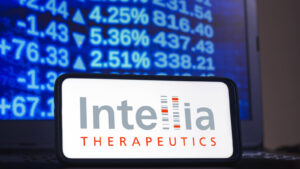
Gene editing could revolutionize how millions of patients are treated all over the world. That could create big opportunities for some of the most exciting gene-editing stocks.
Look at gene editing stocks, like CRISPR Therapeutics (NASDAQ:CRSP), for example.
Several weeks ago, the U.S. Federal Drug Administration approved a new gene-editing treatment for sickle cell disease and transfusion-dependent beta-thalassemia, a genetic disorder that prevents the production of hemoglobin in the blood.
Since then, CRSP has run from about $40 to a high of $90. Now back to $72.94, it’s oversold and could easily rally back to $90 soon. In fact, with a pipeline full of other potential treatments for immune-oncology, autoimmune diseases, cardiovascular disease and Type 1 diabetes, the CRSP stock could race higher. Plus, with gene editing gaining major traction, the market could be worth about $29.9 billion by the time 2032 rolls around, as noted by Precedence Research.
Even better, there are plenty of other gene-editing stocks with similar potential. Here are three ideas you may want to jump on today.
Intellia Therapeutics (NTLA)

The last time I mentioned Intellia Therapeutics (NASDAQ:NTLA), it traded at around $27 a share on Feb. 13. After hitting a high of $34.87, it’s now back to $27.78, where it just caught support. From here, I’d like to see it initially retest prior resistance above $34.
As I noted at the time, NTLA “announced that interim results from Phase 1 of its Phase 1/2 study of NTLA-2002 were published in the New England Journal of Medicine.” It found that “9 out of 10 patients remained completely attack-free following the 16-week primary observation period through the latest follow-up” for the treatment of hereditary angioedema.
Moving forward, the company plans to initiate Phase 3 trials of that treatment. It’s also still on track to dose the first patient in a Phase 1 study of NTLA-3001, a candidate for the treatment of alpha-1 antitrypsin deficiency (AATD)-associated lung disease. Better, NTLA just announced the first patient was dosed in a Phase 3 trial of NTLA-2001 for treating transthyretin amyloidosis with cardiomyopathy.
Verve Therapeutics (VERV)

I also mentioned Verve Therapeutics (NASDAQ:VERV) on Feb. 13, as it traded at around $12. After hitting a high of $19, it’s now back to $13.38, where it appears to have caught strong support.
At the time, I noted a clinical trial showed that VERVE-101 led to reductions of disease-causing LDL-C in people living with HeFH. Even better, further success could expose the company to the 31 million people around the world dealing with familial hypercholesterolemia.
Since then, CEO Sekar Kathiresan, M.D. noted, “Looking ahead in 2024, we expect to dose the first patient in the United States, complete enrollment in the ongoing Phase 1b trial of VERVE-101, and provide a data update. We also expect to initiate the Heart-2 Phase 1b trial for VERVE-102 targeting PCSK9 in the first half of this year, followed by initiation of a Phase 1b trial for VERVE-201 targeting ANGPTL3 in the second half of the year.”
Better, the company posted better-than-expected earnings. Fourth quarter EPS of a 69-cent loss beat by 13 cents. It had revenues of $5.14 million — up nearly 409% year over year — beat by $3.97 million. It also ended its recent quarter with $624 million in cash.
Global X Genomics & Biotechnology ETF (GNOM)

Or, if you want to diversify at a low cost, there’s the Global X Genomics & Biotechnology ETF (NASDAQ:GNOM), which I also mentioned on Feb. 13.
At the time, it traded at around $11. After testing $12.50, it’s now at $11.45, where it appears to have bottomed out. From here, I’d initially like to see it retest $12.50. In the long term, I’d like to see GNOM test $28 a share again.
With an expense ratio of 0.50%, the ETF invests in companies that could benefit from gene editing, genomic sequencing, genetic medicine/therapy, computational genomics and biotechnology, as noted by GlobalXETFs.com. What’s nice about an ETF like GNOM is I can diversify with its 41 holdings for just $11 a share.
If I were to buy 100 shares, it would cost me $1,100 for that exposure. If I were to buy just one of its 42 holdings — let’s say 100 shares of CRSP — it would cost me close to $7,300.
On the date of publication, Ian Cooper did not hold (either directly or indirectly) any positions in the securities mentioned. The opinions expressed in this article are those of the writer, subject to the InvestorPlace.com Publishing Guidelines.




